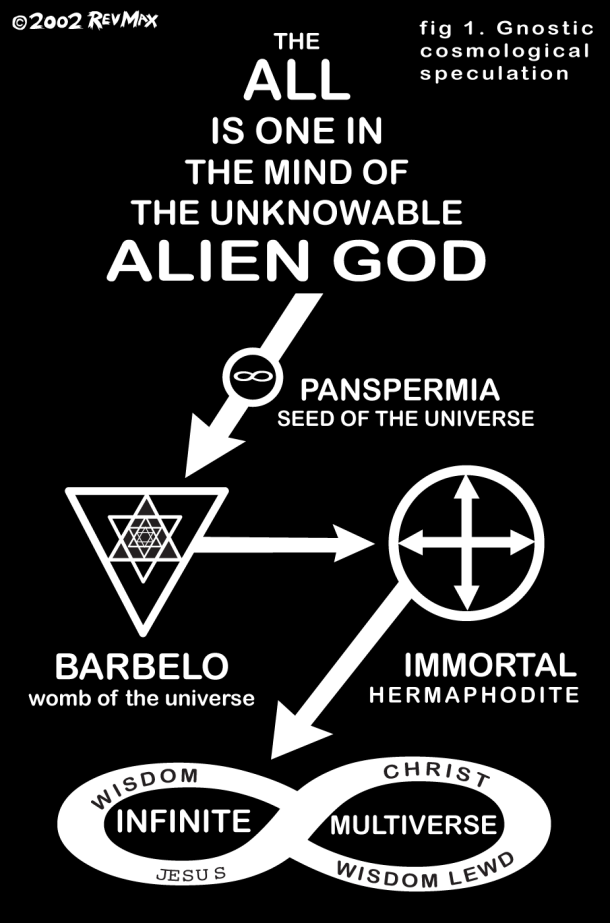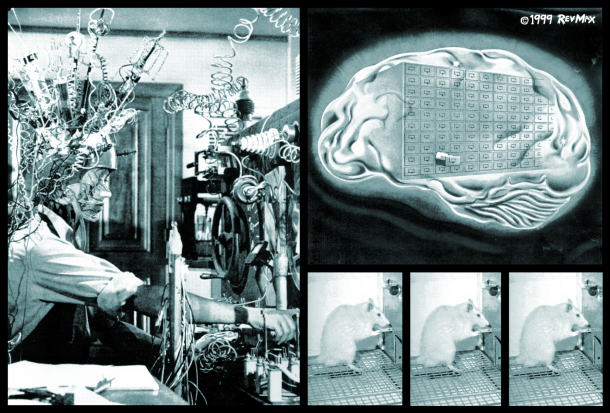The gnostic Christians acknowledged a supreme being, but their god was not the bumbling, all-too-human creator god of the Bible. The Yahweh of Genesis was wrathful, jealous, particular and vindictive; how could he be the highest form of mind, when he couldn’t even rise to the ethical level of an unusually well-balanced human?
Instead, the gnostics looked past Yahweh to perceive the barest traces of another god far above him, an “infinite” and “incomprehensible”1 being who was beyond language, beyond religion, and ultimately, beyond even human thought. The gnostic teacher Silvanus put it this way:
“… it is not difficult to know the Creator of all creatures, but it is impossible to comprehend the likeness of this One. For it is difficult not only for men to comprehend the All, but it is also difficult for every divine being, both the angels and the archangels.”2
This being – named variously the “Alien God,” the “All” and the “One” – was the ultimate source of everything, even the other gods; the gnostic slogan “the All is One” expresses this idea well. Everything we can see or feel – and many things we can’t – are all just a part or projection of this one, unseen, and unknowable god, and outside of this god, nothing else exists.
So elusive, so slippery, so alien and so rarefied was this alien god that one gnostic scripture advises against even thinking “of it as a god, or like a god” because “it is greater than a god… It does not exist within anything… since everything exists only within it.”3
The implications of this last statement are mind-boggling; what we are talking about here is not pantheism, or the pagan idea that “the world is god,” but panentheism, or the idea that:
“…all is in God, somewhat as if God were the ocean and we were fish. If one considers what is in God’s body to be part of God, then we can say that God is all there is and then some. The universe is God’s body, but God’s awareness or personality is greater than the sum of all the parts of the universe… Panentheism… [posits] an all-encompassing, growing, perfect God, everywhere present and containing everywhere within himself…”4
The closer one comes to understanding this alien god, the gnostic scriptures tell us, the more unspeakable – or even impossible – this understanding become; in line with this idea, the gnostic scriptures tend to define the alien god almost solely in negative terms:
“It is impossible to say, ‘How much is it?’ or ‘What kind is it?’ for no one can understand it. It is not one among many things that are in existence: it is much greater. Not that it is actually greater. Rather, as it is in itself, it is not a part of the worlds or of time…”5
At the same time, however, this alien god “…is the head of all the worlds, and…sustains them through its goodness”; paradoxically, to the extent that God is greater than that which God contains, God is also unknowable. The theologian Karl Barth expressed the same idea in modern language, writing:
“God is the unknown God, and, precisely because He is unknown, He bestows life and breath and all things. Therefore the power of God can be detected neither in the world of nature nor in the souls of men.”6
Existing inside of inside of god, we can never hope to fully understand god; in this realization, the gnostics anticipated the findings of today’s postmodern theorists and quantum physicists by several thousand years.
- “The Sophia of Jesus Christ.” The Nag Hammadi Library. Ed. James Robinson. HarperCollins, 1978. 224-225. [↩]
- “The Teachings of Silvanus.” The Nag Hammadi Library. Ed. James Robinson. HarperCollins, 1978. 387. [↩]
- “The Secret Book of John.” The Secret Teachings of Jesus. Trans. Marvin W. Meyer. Vintage, 1984. 57-58. [↩]
- New Thought: A Practical American Spirituality. Ed, Deborah Whitehouse. Authorhouse, 2003. 89-92. [↩]
- “The Secret Book of John.” The Secret Teachings of Jesus. Trans. Marvin W. Meyer. Vintage, 1984. 57-58. [↩]
- Bloom, Harold. The American Religion. SImon & Schuster, 1992. 212-213. [↩]


